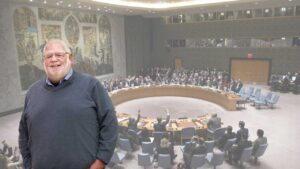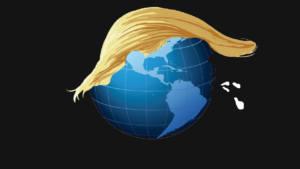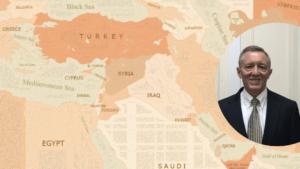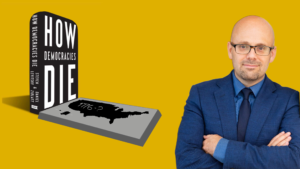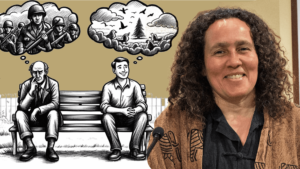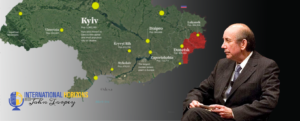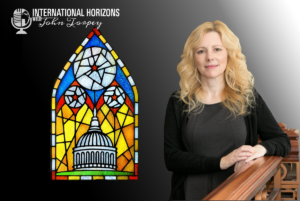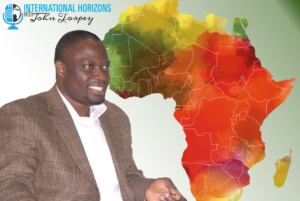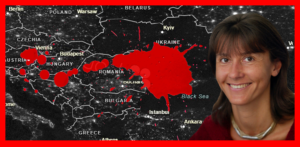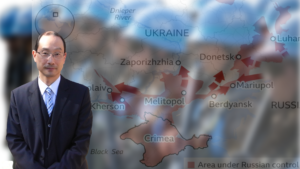International Horizons
International Horizons is a podcast of the Ralph Bunche Institute for International Studies that brings scholarly expertise to bear on our understanding of international issues. The International Horizons podcast is our latest effort to bring our research and scholarship to a broader public.
With John Torpey on sabbatical this year, the host of the podcast will be interim director of the Ralph Bunche Institute, Eli Karetny.
You can subscribe to International Horizons on iTunes, Spotify, or Soundcloud.
Our latest episodes
- Trump, the UN Charter, and the Strange Politics of International LawInternational law scholars are often among the sharpest critics of the Trump administration—but what if the usual story misses something essential? In this episode, RBI interim director Eli Karetny speaks with NYU international law professor Robert Howse about Trump’s complicated relationship with the UN Charter system, from Gaza to Venezuela and Iran. The conversation also
- Liberalism as a Way of Life: Freedom, Generosity, and the Crisis of MeaningWhat happens when liberalism stops feeling like a victory and starts feeling like an exhaustion?In this episode of International Horizons, RBI Director (acting) Eli Karetny speaks with philosopher Alexandre Lefebvre about liberalism not merely as a political doctrine, but as a lived way of life. Against the backdrop of rising populism, nationalism, and post-liberal regimes,
- Inside Jobs: How Great Powers Meddle in Other Countries’ ElectionsFrom Argentina’s recent vote under the shadow of a threatened $20 billion U.S. aid package to Russia’s covert operations in the 2016 U.S. election, foreign meddling at the ballot box is more common and more dangerous than many citizens realize. In this episode of International Horizons, RBI interim director, Eli Karetny speaks with Dov Levin,
- Can America Still Lead? Foreign Policy in an Age of Division with Joel RubinWhat happens when America loses its foreign-policy playbook? RBI acting director Eli Karetny talks with veteran diplomat and policy strategist Joel Rubin about the vacuum of strategic vision shaping U.S. decisions from Venezuela to Ukraine to Gaza. Rubin pulls back the curtain on factional battles inside both parties, the dangers of politicizing diplomacy, and why
- The Technological Soul: Alex Priou on Modernity, Ideology, and the Limits of ReasonIn this episode of International Horizons, RBI acting director Eli Karetny speaks with Alex Priou, Professor of Political Philosophy at the University of Austin, about how technology and ideology shape the modern soul. From Machiavelli’s “dikes and dams” to Odysseus’s struggle against the Sirens, Priou traces how modernity’s drive for control has left us materially
- Kubrick’s Worlds: Power, Paranoia, and the Politics of the Human ConditionIn this episode of International Horizons, Interim Director Eli Karetny speaks with film scholar Nathan Abrams about the enduring relevance of Stanley Kubrick and what his work can teach us about our current era. From the nuclear absurdities of Dr. Strangelove to the cosmic rebirth of 2001: A Space Odyssey, Kubrick’s films expose the fragile
- Illiberalism, Putin, and the Politics of ReligionIn this episode of International Horizons, RBI interim director Eli Karetny speaks with Marlene Laruelle, Research Professor at George Washington University and director of the Illiberalism Studies Program, about the rise of illiberalism in Russia and beyond. They explore how illiberal movements define themselves against liberalism, Russia’s evolution since the 1990s, and how Putin has
- Authoritarian Ideas, Old and New: From Schmitt to “JD”On this episode of International Horizons, RBI Acting Director, Eli Karetny talks with Richard Wolin (Distinguished Professor, CUNY Graduate Center) about the intellectual roots of today’s anti-liberal right. Tracing a line from Germany’s “conservative revolutionaries” (Carl Schmitt, Oswald Spengler, Ernst Jünger, Heidegger) to France’s nouvelle droite and “great replacement” rhetoric, Wolin shows how cultural critiques
- Is the U.S. helping speed up its own decline? with Damon LinkerWe begin the new season of International Horizons by asking a crucial question: is the U.S. helping speed up its own decline? RBI Deputy Director, Eli Karetny talks with political writer and scholar Damon Linker about how Trump’s movement sees presidential power, why it challenges long-standing rules and institutions, and what it means for America’s
- What We Get Wrong About Iran, with Vali NasrIn this episode of International Horizons, RBI director John Torpey talks with Vali Nasr, Majid Khadduri Professor of International Affairs and Middle East Studies and former dean at Johns Hopkins University’s School of Advanced International Studies, about Iran’s dangerous crossroads after its latest clash with Israel and the United States. Nasr argues that Western narratives
- The Good Father Syndrome: Why Strongmen Still Seduce?In this episode of International Horizons, RBI director John Torpey speaks with Stephen Hanson and Jeffrey Kopstein, co-authors of The Assault on the State: How the Global Attack on Modern Government Endangers Our Future (Polity Press, 2024). In this conversation, they discuss how today’s right-wing movements, from the United States to Hungary, are waging a new form of
- Populism, Power and the Crisis of GlobalismWhat explains the growing divide between elites and the broader public in democracies across Europe and the United States? In this episode of International Horizons, sociologist Wolfgang Streeck joins RBI director John Torpey to discuss the rise of populism, the limits of globalism, and the tensions between democracy and capitalism. Drawing from his recent book, Taking
- Walls, Warnings, and the War on FentanylIn this episode of International Horizons, Peter Andreas, John Hay Professor of International Studies at Brown University and author of Border Games: The Politics of Policing the U.S.-Mexico Divide, 3rd edition (Cornell UP, 2022) and The Illicit Global Economy (Oxford UP, 2025), joins RBI Director John Torpey to unpack the myths and realities of border control, illicit trade, and tariffs in the
- Human Rights in the Trump EraIn this episode of International Horizons, Kenneth Roth, former longtime executive director of Human Rights Watch, joins RBI director John Torpey to discuss Roth’s recent book, Righting Wrongs: Three Decades on the Front Lines Battling Abuse of Governments (Knopf, 2025), which reflects on strategies for defending civil, political, economic, and social rights in an increasingly complex international
- Fractured Alliances: Trump, Ukraine, and Europe’s Security DilemmaIn this episode, RBI director John Torpey speaks with Estonian parliamentarian and defense expert Kalev Stoicescu about the recent tensions between the United States and Ukraine following a contentious meeting between Presidents Trump and Zelensky. Stoicescu critiques Trump’s transactional diplomacy, emphasizing the critical role of alliances such as NATO in maintaining international peace and stability.
- Coup Attempts and Democratic Resistance: Lessons from BrazilAs Brazil moves toward trying former president Jair Bolsonaro for plotting a coup against democracy, the United States grapples with constitutional challenges from the new administration as well. Are these two cases of democratic backsliding comparable? In this episode of International Horizons, John Torpey speaks with José Maurício Domingues, Professor of Social and Political Science at the
- The Internet, Power, and the Deep StateAs the second Trump administration reshapes the U.S. government and its role in the world, how do technology, media, and political power intersect? In this episode of International Horizons, host John Torpey speaks with Zeynep Tufekci—New York Times columnist, Princeton professor, and author of Twitter and Tear Gas—about the evolving relationship between social media platforms, political movements,
- TrumpWorld: Canada, South Africa, Germany, and the Global Far-RightIn this episode of International Horizons, John Torpey talks with Heribert Adam, Professor Emeritus of Sociology at Simon Fraser University in Vancouver, Canada, to unpack the global ripple effects of Donald Trump’s return to power. From his startling proposal to make Canada the 51st state to his controversial foreign aid cuts targeting South Africa, Trump’s policies
- American Higher Education Under the Second Trump AdministrationIn this episode of International Horizons, RBI Director John Torpey speaks with Steven Brint, Distinguished Professor of Sociology and Public Policy at UC Riverside, about the early days of the second Trump administration and its impact on higher education. Brint discusses the administration’s aggressive efforts to reshape federal governance, including its attacks on DEI programs, proposals
- Trump’s Second Term and EuropeIn this episode of International Horizons, RBI director John Torpey interviews Nathalie Tocci, director of the Institute of International Affairs in Rome, about the implications of Donald Trump’s second administration for Europe. The discussion explores how Trump’s approach to foreign policy—characterized by protectionism, nationalism, and disdain for multilateralism—affects European politics, particularly in relation to NATO, trade,
- Transatlantic Tensions: Trump’s Return and Europe’s Far-Right ResurgenceIn this episode of International Horizons, RBI director John Torpey interviews journalist Mattia Ferraresi about the implications of a potential second Trump presidency for European politics. Ferraresi discusses how Trump’s rhetoric and policies, including his stance on NATO and trade, might influence transatlantic relations. The conversation explores the rise of far-right nationalism in Europe, with a
- Trump’s Mass Deportation Plan: Can He Really Do It?Kitty Calavita, Chancellor’s Professor Emerita of Criminology, Law and Society at the University of California, Irvine, discuss the historical context and implications of Operation Wetback, a 1954 U.S. mass deportation of Mexican immigrants, and its relevance to President-elect Donald Trump’s proposed mass deportation plans. Calavita explains that Operation Wetback aimed to address the economic utility of undocumented workers and political backlash against them, particularly during a recession and Cold War rhetoric. She highlights the logistical challenges of such operations, including the integration of immigrants into various industries and the legal protections against random stops. Calavita suggests that while high-profile roundups may occur, a massive deportation campaign is unlikely due to economic and logistical obstacles.
- Middle East on the Brink: Escalation, Diplomacy, and the Search for StabilityThe current conflict in the Middle East has raised pressing concerns about the potential for a wider regional war. What do escalating tensions in Gaza, Lebanon, and beyond mean for the future? Join John Torpey on International Horizons as he discusses the complexities of the Middle East with Win Dayton, a retired senior member of the U.S. Foreign Service. Dayton shares insights from his decades of diplomatic experience, exploring the shifting dynamics of U.S. foreign policy, the challenges of intervention, and the prospects for stability amidst growing regional and global pressures.
- Shared Paths: Exploring Jewish and Muslim Experiences in AmericaThis week on International Horizons, John Torpey, Director of the Ralph Bunche Institute, speaks with sociologists Mucahit Bilici and Samuel Heilman about their book, Following Similar Paths: What Jews and Muslims Can Learn From One Another (University of California Press, 2024). Bilici and Heilman explore how Judaism and Islam, as minority religions in the U.S., share common challenges
- The UN and its discrete diplomacy in peacemakingThis week on International Horizons, RBI Director John Torpey interviews Bertrand Ramcharan, former top UN diplomat and author of the recent book, The UN Security Council and Its Protective Function (Melrose Legal Publishers, 2024). Ramcharan describes the many instances in which the UN Secretaries-General worked discreetly to secure peace agreements in conflicts such as the Iran-Iraq war,
- The Far-Right Threat in German PoliticsThe recent elections in eastern Germany, where the Alternative for Germany (AfD) became the first far-right party to win a parliamentary election at the state level in postwar Germany, raised significant concern internationally about what’s happening in Germany. Should we be concerned? In this episode of International Horizons, RBI Director John Torpey talks with Marcus Böick,
- International Horizons: Are we experiencing a crisis of culture?In this episode of International Horizons, RBI director John Torpey spoke with Olivier Roy, professor of social and political sciences at the European University Institute in Florence, Italy, and author of The Crisis of Culture: Identity Politics and the Empire of Norms. Roy argues that neoliberal globalization is dissolving not just subordinate cultures but also dominant
- Notes from the Field: A Personal View of the War on GazaWe start this season of International Horizons with an interview with Dr. Eli Karetny, an American political scientist and administrative director of the Ralph Bunche Institute who spent the last academic year in Israel with his family. The plan was to do research on the Israeli Bedouin in the Negev desert – until the Hamas
- The Social Acceptance of InequalityOn this episode of International Horizons, Francesco Duina, Charles A. Dana Professor of Sociology at Bates College and Luca Storti, Associate Professor of Economic Sociology at the University of Turin in Italy and a Research Fellow of the Ralph Bunche Institute for International Studies, discuss the rise of inequalities around the globe and the divergent
- The Climate Crisis as a Problem of Collective ActionIn this episode of International Horizons, Professor Dana Fisher, Director of the Center for Environment, Community, & Equity (CECE) and Professor in the School of International Service at American University, discusses with RBI Director John Torpey her approach to dealing with the climate crisis. Fisher explains how the climate crisis is really a social crisis
- What does Biden’s temporary suspension of offensive arms transfers mean for US-Israeli relations?Charles Blaha, a former State Department expert on the vetting of U.S. weapons transfers to other countries, helps us understand this important moment in the Israel-Hamas conflict. After an extended period of tension between U.S President Joe Biden and Israeli Prime Minister Benjamin Netanyahu, Biden has decided to freeze some transfers of weapons to Israel,
- The Rhetoric of Crisis in Israel-PalestineThis week, RBI Director John Torpey speaks with Amos Goldberg, Professor of Holocaust History at the Department of Jewish History and Contemporary Jewry at the Hebrew University of Jerusalem, about the ongoing war between Israel and Hamas. Among other rhetorical aspects of the conflict, Goldberg reflects on the meaning of such slogans as “From the river
- Words of AttackRhetoric Against Liberal Democratic Values with James McAdams. With a presidential campaign in the US just around the corner and populist and authoritarian thinkers gaining broader platforms, University of Notre Dame political scientist A. James McAdams shines a light on the terms being used today by the Far Right to undermine liberal democracy. How successful
- Why Should We Preserve Memory of the Holocaust?Wojtek Soczewica has led the Auschwitz-Birkenau Foundation since 2019, near the site of the killing fields. The Foundation aims at the preservation of the remains of the concentration and extermination camp and of all the personal items that belonged to victims and survivors. Today they serve as material witnesses of the tragic history safeguarding “the place
- Citizenship Across Time and Space with David JacobsonIn this episode of International Horizons, RBI director John Torpey discusses the past and future of citizenship with David Jacobson, Professor of Sociology at the University of South Florida (Tampa). They discuss the origins of the concept of citizenship in the ancient Near East a few thousand years ago and how kinship notions shape the
- How can we reach international consensus on AI regulation?In this episode of International Horizons, RBI director John Torpey interviews Gabriele Mazzini, a lawyer and officer of the European Commission and expert in AI regulation. Mazzini discusses the means through which European countries have found agreement on the definition of AI and how to regulate it. Moreover, Mazzini stresses that the fears of an
- How Democracies Die . . . and How They May Survive with Daniel ZiblattIn this episode of International Horizons, RBI director John Torpey interviews Daniel Ziblatt, Eaton Professor of the Science of Government at Harvard University and co-author (with Steven Levitsky) of the bestsellers How Democracies Die (Crown, 2019) and The Tyranny of the Minority (Crown, 2023). Ziblatt emphasizes the crucial role played by conservative parties that were committed to democracy in
- Why is right-wing extremism so widespread in Italy?In this episode of International Horizons, RBI director John Torpey interviews Marla Stone, a historian of Italian fascism at Occidental College, on the resurgence of the far right in Italy. The conversation delves into the origins of this resurgence and how Italy, a fairly homogeneous society, became a recipient of hundreds of thousand migrants, altering the
- “War is What you Make of It” with Neta CrawfordWe begin this new season of International Horizons with an interview by RBI Director John Torpey with Neta Crawford from Oxford University and the Cost of War Project. Prof. Crawford argues that conflict is less lethal than in the past, although the overall costs of war exceed the duration of previous wars in many dimensions.
- Is Poland back on track? The challenges for the new government.In this episode of International Horizons, RBI’s Director John Torpey interviews Grzegorz Ekiert, Chair of the Center for European Studies at Harvard University, a propós of the recent election in Poland that installed a centrist government led by former prime minister and president of the European Council Donald Tusk. Ekiert starts by discussing the paradoxes
- The Everyday life behind Berlin WallIn this episode of International Horizons, RBI director John Torpey interviews historian and journalist Katja Hoyer about her book Beyond the Wall: A History of East Germany (Basic Books, 2023). The conversation begins with a discussion of the personal reasons that the author, herself born in the GDR, wanted to cover the untold stories of
- Israel, Hamas, and American Jews in a Time of WarOn today’s episode of International Horizons, Ralph Bunche Institute Director John Torpey speaks with Jodi Rudoren, editor-in-chief of the Forward magazine, about the situation in Israel and Gaza. She notes that Hamas’s incursion into Israel on October 7, 2023, shattered the paradigm of how Israel and even the Arab world understood what Hamas was all about. The
- The U.S. State Department and Ever-Changing Global PoliticsIn this episode of International Horizons, Ralph Bunche Institute Director John Torpey interviews Assistant Secretary of State for Global Public Affairs Bill Russo. Assistant Secretary Russo commented on the role of the United States in the ever-changing dynamics of global politics and how it is perceived as a leader in conflict resolution and often called
- Iran, Hamas and Israel: The Perils of OverreactionIn this episode of International Horizons, Colin Clarke, director of research at the Soufan Center, discusses the possible trajectories of the Israel-Palestine conflict with RBI director John Torpey. Clarke introduces the linkages of Hamas with Iran and the way in which the Iranian government backs a number of different proxy groups in the Middle East.
- From the Invention of Passport to the Golden PassportIn this episode of International Horizons, RBI director John Torpey interviewed Kirstin Surak professor at the London School of Economics, about her new book, The Golden Passport: Global Mobility for Millionaires (Harvard University Press, 2023). The conversation starts with the contrast of Torpey’s The Invention of the Passport (Cambridge UP, 2018) and the “golden passport,” which
- AI, post-truth, and cultural transformationIn this episode of International Horizons, RBI director John Torpey talks with economists Luciana Lazzaretti and Stefania Oliva of the University of Florence about the role of artificial intelligence in contemporary cultural transformation. The authors discuss the genesis of computer culture from the garages of California hippies who dreamed of a changed world and unexpectedly
- Resentment: The complexity of an emotion and its effect on politicsIn this episode of International Horizons, RBI director John Torpey interviews Rob Schneider, Professor of History at Indiana University-Bloomington, about the political effects of resentment. Schneider begins by discussing the psychological complexity of resentment and then delves into its understanding by other authors such as Nietzsche and its relationship with Catholicism. Moving forward, Schneider discusses
- Should we be optimistic about global governance? On the future of the UN with the ICG’s UN Director Richard GowanThis week on International Horizons, RBI director John Torpey interviewed Richard Gowan, UN director of the International Crisis Group. Gowan discusses the different views of the UN on the occasion of the annual meeting of the General Assembly. The absence of a number of key figures was widely noted, but most major world leaders, such
- Global inequality: Are we really measuring what we should be measuring?In this episode of International Horizons, RBI director John Torpey interviewed Jayati Ghosh, professor of economics at the University of Massachusetts at Amherst, about different debates surrounding inequality. Ghosh criticizes the flaws in some inequality indicators that are focusing only on measuring how the poor are doing and not on how the rich are getting
- India, a Non-aligned member of the International System?We kick off our Fall 2023 season of International Horizons with Upendra Choudhury from Aligarh Muslim University discussing the role of India in the contemporary international system. Prof. Choudhury argues that India’s vision of a multipolar world order consists of acting as a balancing mediator between the traditional West and a rising China. In that sense, Choudhury claims that India cannot
- UN Administrative and Bureaucratic PoliticsJoin us for a conversation with Katja Hemmerich, expert on the United Nations. The session will be chaired by HRH steering committee member and Professor of Political Science at John Jay College George Andreopoulos. RSVP Here
- Negotiating DecolonizationThe Limits of a Fairy Tale with Valerie Rosoux In this episode of International Horizons, Valerie Rosoux, Research Director at the Belgian Fund for Scientific Research (FNRS) discusses the disagreements in the historiography of Belgium’s human rights violations during its colonial activities in Congo, and how Belgium’s case differs from those of Netherlands and France in
- Podcast Interview: The Third UNAn Interview with RBI’s emeritus director Thomas Weiss and Tatiana Carayannis Tatiana Carayannis and Thomas G. Weiss’ book The “Third” United Nations: How a Knowledge Ecology Helps the UN Think (Oxford UP, 2021) is about the Third UN: the ecology of supportive non-state actors—intellectuals, scholars, consultants, think tanks, NGOs, the for-profit private sector, and the media—that interacts
- The Whys and Wherefores of Migration with James HollifieldThis week on International Horizons, James Hollifield, Professor of Political Science and Director of the Tower Center for Political Studies, Southern Methodist University (SMU), discusses the epistemology of migration studies and delves into some of its foundational works. Hollifield addresses how modern migration regulation is related to the invention of the nation-state and how, in order to understand
- Algeria and France: Grievances and the effects of DecolonialismIn this episode of International Horizons, RBI’s director, John Torpey interviewed Laetitia Bucaille about the factors that explain variation in resentment and grievances in former colonies drawing from the cases of Algeria and South Africa. Bucaille delves deeper into the case of Algeria and the affected populations whose identities were crossed cut by institutions and
- The Everyday Feminist with Latanya MappEquality between the sexes has long been recognized as a fundamental moral and legal objective of the UN, and more recently of many governments and international financial and development institutions. Women’s Empowerment has long been recognized as essential to the larger development objectives of the UN and the international community. Extensive empirical data from all
- What can China’s identity politics tell us about affirmative action? with Yan Sunn this episode of International Horizons, RBI director John Torpey interviews Yan Sun, Professor of Chinese politics at Queens College and the Graduate Center, CUNY, to discuss the origins of the ethnic divisions in China and their contemporary effects. Yan addresses the imperial administrative system and the historical incorporation of non-core peoples into it. Furthermore,
- Why do Transatlantic Relations Matter? General Consul of Germany David Gill in the 2023 Otto and Fran Walter LectureThis week on International Horizons, we present RBI’s director John Torpey interview to David Gill, General Consul of Germany in New York to celebrate the 2023 Otto and Frank Walter Memorial Lecture. The conversation goes explaining the term “Zeitenwende” and what that entails for Germans, its history and how the military approach of Germany came
- RBI Director John Torpey to Receive Award for Excellence in International ExchangePresidential Professor John Torpey, Director of the Ralph Bunche Institute for International Studies and the European Union Studies Center, will receive an award from the DAAD Alumni Association-USA for Excellence in International Exchange. The award recognizes Professor Torpey’s long work to organize and support academic exchanges with Germany through the Deutscher Akademischer Austauschdienst (DAAD), or
- Solving Public Problems. A Discussion with Beth NoveckIn this episode of International Horizons, we present the recording of a book talk by John Torpey, Ralph Bunche Institute director, with Beth Noveck, author of Solving Public Problems: How to Fix our Government and Change our World. Noveck begins by underlining that we humans are doing better than ever materially, but we are not
- Two wrongs don’t make a right but… US Lies and Media Reporting in the 2003 Iraq WarIn this episode of International Horizons, journalist and UN director of Human Rights Watch Louis Charbonneau describes the US government misinformation campaign to justify its invasion of Iraq in 2003 and its aftermath. Charbonneau also discusses the role of the media in the lack of questioning of the information they were spreading and contrasts it
- The Role of Global South Women in shaping Global GovernanceThis week on International Horizons, Ellen Chesler interviews Rebecca Adami and Fatima Sator, editor and co-author of Women and the UN: A New History of Women’s International Human Rights that debunks the myth that the UN Charter and the Universal Declaration of Human Rights were Western male-dominated inventions. Moreover, the authors discuss how women did
- “The world’s future will depend on Africa having a good future” Birth rates and the future of social movementsThis week on International Horizons, Jack Goldstone, Virginia E. and John T. Hazel, Jr. Chair Professor of Public Policy at George Mason University and a Global Fellow of the Woodrow Wilson International Center, discusses the role of age and demographics of social movements in the twenty-first century. Goldstone speculates about the possibilities of regime change
- Bauman, Virtuosos, Liquid Love and the Refugee Crisis in Eastern Europe: The Eclectic Research Agenda of Izabela WagnerIn this episode of International Horizons, we are joined by Izabela Wagner of the Institute of Sociology at the Collegium Civitas in Warsaw and Fellow at The French Collaborative Institute on Migration in Paris. She discusses the sociological factors behind the success of virtuoso musicians and on the social pre-conditions of professional excellence. Wagner also
- Why should cultural heritage be protected? Preserving our common historyWhere people are killed and abused in warfare and violent conflict, artifacts of cultural heritage are often destroyed and mistreated as well. Indeed, in the World War II-era efforts to promote the then-novel idea of genocide, the Polish lawyer and activist Raphael Lemkin sought to codify the notion that genocide was both personal and cultural.
- Where is the Left? The rise and decline of social democratic movementsPopulism, nationalism, and ethnic and religious chauvinism stalk the global landscape; culture wars pervade the political scene; and democracy stagnates, erodes, or is on the ropes at the hands of would-be strongmen the world over. How did we arrive at this historical path? What is the relationship between the deterioration of social democracy and the
- A Left Turn? The Politics of Latin America TodayThis week, RBI director John Torpey interviews Enrique Desmond Arias, a professor of political science at Baruch College and the Graduate Center, about recent developments in Latin American politics. Arias delves into Peru’s recent political unrest and how it resembles the times of Fujimori’s authoritarianism and discusses the origins of polarization in the politics of
- Contextualizing the Iranian ProtestsThe Role of Women in Leading the Change Western sanctions have slowed Iran’s economy, causing protests against the absence of freedom and opportunities — teachers their lack of pay; farmers their lack of water; retirees their fear of economic insecurity. But at the heart of this powerful new movement has been Iran’s women, whose frustration
- How did the pandemic transform workers and work?The pandemic brought to the fore a group of workers deemed “essential” – frontline healthcare workers, restaurant employees, slaughterhouse workers, and the like – who often faced a difficult choice between risking their health to work or forgoing income that they couldn’t afford to do without. Often, they had to work even though they couldn’t
- Involution and Negative Equilibrium: explaining the ongoing conflict in the CongoThis week on International Horizons, RBI director John Torpey is joined by Jason Stearns, assistant professor of international studies at Simon Fraser University, who discusses how the Congolese government is invested in conflict on its territory. Stearns traces the current conflict back to the Belgian colonial heritage that created an ethnic disbalance in the population
- Is China’s Communist Party threatened by the Protests? With William HurstNationwide protests against Covid-related restrictions broke out recently in China following years of a “Zero-Covid” policy imposed by the Chinese Communist Party. The demonstrations, widespread but not coordinated, were the largest since the protests at Tiananmen Square in 1989. Protesters objected to unpredictable lockdowns, incessant testing requirements, and weeks’ long isolation and uncertain access to
- Protests in Iran: Maybe not the Tocqueville paradox. With Ali AnsariIn mid-September of this year, a young Iranian woman named Mahsa Amini died under suspicious circumstances after her arrest by the morality police for improperly covering her hair. Her death set off a huge wave of protests across Iran – the biggest in many years. The protesters’ rallying cry was “Women, Life, Freedom,” and women
- What is the Role of Europe in the Changing World Order?The transatlantic relationship, arguably the bedrock of the world’s post-World War II international security architecture, came under significant threat during Donald Trump’s tenure in office, as Trump complained about European untrustworthiness and talked about pulling the United States out of NATO. Yet in the aftermath of the Russian invasion of Ukraine, the transatlantic relationship has
- What is the Future of Populism? With Umut KorkutThe world’s wealthier countries have in recent years faced challenges from right-wing populist parties and movements that may rejuvenate origins from relatively far in the past, such as in the case of Italy, or they may constitute new formations disturbingly reminiscent of earlier movements of their kinds. So, for example, the Alternative for Germany, in
- Can We Square the Circle? Universalism versus communitarianism with Emmanuel Dalle Mulle and Ivan SerranoThe political Left has long faced tension regarding its universalistic commitments and those to the nation it inhabits. The dilemma is captured succinctly in the Declaration of the Rights of Man and Citizen that articulated leftist or progressive devotion to both man in the historic collective sense of human beings, as well as to the
- Observations about the hard-born wisdom of old age with David TroyanskyThe world’s population has just passed the 8 billion mark and an increasing proportion of those people are old, including increasingly the so-called “old old” in their 90s and beyond. Indeed, never before have so many older people inhabited the planet. Are we prepared for them? Given the inevitable medical and health challenges that accompany
- A most similar comparison: The authoritarianism of Poland and Hungary with Edit Zgut-PrzybylskaThe leadership of Hungary and Poland seemingly shared the same playbook when it came to undermining judicial independence, consolidating electoral power, regulating media ownership and enacting laws against LGBTQ rights and abortion. They also work together to push back against the European Union’s efforts to sanction member states pursuing illiberal reforms. However, since the Russian
- What is the role of minorities in the modern state? with Fernand de VarennesThe existence of minorities has been an unavoidable reality of the creation of nation states that almost always have a dominant national group inscribed in their names. From this perspective, Germany is a country for Germans and Australia is a country for Australians. But there are invariably others who don’t fit the heritage or the
- How to avoid more damage from the Russian war on Ukraine? with Marcus StanleyThe Western coalition supporting Ukraine in its war with Russia has so far been thought to be solid and reliable, but there may be vulnerabilities in that support. Even as Russia seems to be in disarray on the battlefield and elsewhere, it’s been believed all along that Vladimir Putin would use his control over oil
- Is Italy going fascist again? What to expect from Prime Minister Meloni with Andrea MammoneItaly has just held an election in which it appears that a far-right candidate from a post-fascist Party has won, and its leader will become the next prime minister of the country. What’s happening in Italy? What does this election tell us about wider developments in Europe today? In this episode of International Horizons, Andrea
- Quo Vadis Britannia; where is Britain going? With Adrian FavellThe United Kingdom has experienced a number of epochal transitions of late, starting with its departure from the European Union in early 2020, and more recently, the replacement of the chaotic conservative leader Boris Johnson by former Foreign Minister Liz Truss, and soon thereafter the passing of Queen Elizabeth after some seven decades on the
- Sri Lanka: Meet the new dynast, same as the old dynast with Farzana HaniffaSri Lanka has recently endured tremendous political and economic turmoil with severe shortages of goods and fuel leading to the ouster of the sitting president. After Gotabhaya Rajapaksa fled the country in disgrace, he was replaced by another dynastic heir, Ranil Wickremesinghe. While much has changed in the once war-torn island nation, much has thus stayed the same. Welcome to International Horizons, a podcast to the Ralph Bunche Institute for International Studies that brings scholarly and diplomatic expertise to bear on our understanding of a wide range of international issues.
- Closer to a standstill on Ukraine: Time for decision with Amb Roman PopadiukWe open this season of International Horizons with former US Ambassador to Ukraine Roman Popadiuk, who talked to RBI Director John Torpey about the history of Ukrainian-US relations and how the Budapest Memorandum meant to protect Ukraine as it surrendered its nuclear arsenal failed to stop Russia. Moreover, Ambassador Popadiuk recounts the Russians’ gains and setbacks during the invasion and how the conflict is approaching a standstill pending the outcome of negotiations. Finally, Ambassador Popadiuk underscores that the likelihood of nuclear escalation is very low, because it would bring new uncertainties for Russians that they cannot afford having.
- The role of religion in shaping political views, especially on abortion — with Amy AdamczykIn this episode of International Horizons, sociologist Amy Adamczyk of CUNY’s John Jay College of Criminal Justice discusses the role of religion in determining people’s attitudes on a range of issues such as abortion and homosexuality. From a global perspective, we also discuss the peculiarities of religiosity in the United States, which is an outlier because of its relatively high levels of religiosity compared to other wealthy democracies. Adamczyk also discusses the intersection between religion, abortion and LGTBQ+ issues, considering that the world has become widely accepting of sexual diversity in the past 20 years. Finally, the conversation revolves around Adamcyzk’s most recent co-authored book Handing Down the Faith: How Parents Pass Their Religion on to the Next Generation, which addresses the factors that make children religious.
- Achievements and challenges of LGBTQ+ people with Adrian ComanIn this episode, LGBTQ activist Adrian Coman talks to John Torpey, Presidential Professor of Sociology and History at the Graduate Center and director of the Ralph Bunche Institute, about the clashes between domestic laws and those of the European Union, the challenges of LGBTQ activism, how politicians instrumentalize homophobia to stay in power, the controversy over trans teens, and the key issues to be addressed in order to increase inclusion.
- How is American exceptionalism reflected in sports? With Andrei MarkovitsThe US women’s soccer team recently reached a deal with the owners of American Professional Soccer for pay equity with the men. It was noted that the women’s soccer teams in the United States were more successful on the international stage and were generating considerable revenue for investors, and yet women had been on the
- “We don’t know what we don’t know about Africa” with Ebenezer ObadareAfrica has grown economically in recent years in such a way that many of its populations now enjoy both the benefits and the drawbacks of a middle-class western lifestyle. Yet it is also growing rapidly in demographic terms due to the combination of high fertility and lower mortality, raising questions about employment and development generally.
- Depoliticization of International Organizations: between functional necessity and pragmatism with Marieke Louis and Lucile MaertensThis week, RBI director John Torpey talked with Marieke Louis and Lucile Maertens about the trending depoliticization of international organizations and its effects for achieving results and enhancing cooperation. The discussion covers the causes of depoliticization, its framing in comparison to past years, the dangers of politicizing certain issues and not informing policy on science, and how depoliticization may end up protecting the status quo.
- The Polish Response to the Ukrainian Refugee Crisis with Rand Richards CooperSome 12 million Ukrainians – a quarter of the population — have been forced to flee their homes or their country as a result of the Russian invasion of Ukraine. Millions are concentrated in Poland as well as in other countries in the region: Romania, Hungary, Moldova, Finland, Germany and elsewhere. How are they faring
- Propaganda, protest, and repression in Russia: an insiders look with Anna ZhelninaHow do Russians feel about the war in Ukraine? What information are they getting about the war? What about the reports of people leaving, especially people in the tech world, but certainly in other fields as well? Are Russians protesting the war? Or has there been too much repression and disinformation for them to want
- Ivan Krastev on how the Invasion of Ukraine is Transforming Europe & Transatlantic RelationsThis week, International Horizons showcases an interview by RBI and EU Studies Center director John Torpey with political scientist Ivan Krastev about how Russia’s invasion of Ukraine will affect the balance of power in Europe, transatlantic relations, and the future of democracy. How does the war change existing political divisions, and what should the role of NATO of the
- The China threat is not existential, but it is significant. With Andy NathanChina has become a powerful global actor with what increasingly seems like a potential claim to global primacy. Is it an economic powerhouse and a rising hegemon? Or is its economy more fragile than we tend to think? Some have suggested that we’re in a new Cold War, but how does the relationship between the
- How did Orban win a fourth term? Illiberal democracy in Hungary with David JancsicsHungary’s Viktor Orban, the originator of the notion of illiberal democracy, has now been re-elected for four more years as Prime Minister of Hungary. This is on top of the 12 years that have preceded this election, and a previous stint as prime minister. This time he won with a supermajority that allows his party to revise the Constitution unilaterally. How did he do it? What can we expect from the ruler whom many regard as the greatest threat to democracy and Eastern Europe other than Russia? What will the EU do?
- The war in Ukraine and its consequences for the global food supply with Catherine BertiniRussia’s war on Ukraine has led to thousands of civilian deaths, thousands more soldiers’ deaths and millions of refugees and internally displaced persons. But this is only the beginning of the human toll of the Ukrainian war. A number of commentators have observed that perhaps the most important humanitarian consequence of the war may have to do with its effect on the availability and price of food around the globe. What will the war’s effect on the global food supply look like?
- Why is the War on Ukraine Decisive for the Future of the West? With Metin HakverdiTwo foreign and defense policy. In particular, it has agreed to substantially raise its military spending, as well as to give substantial weaponry to the Ukrainians to assist them to defend themselves. Recently installed, Chancellor Olaf Scholz called it “Zeitenwende,” a “watershed” or perhaps more literally an “epochal transformation.” It’s been noted that this watershed development has also taken place with three women in the top security and defense jobs in the new German government: at defense Christine Lambrecht, minister of foreign affairs Annalena Baerbock, and interior affairs Minister Faeser.
- What you probably haven’t heard about Russia’s invasion of Ukraine with Kadri LiikThe Russian invasion of Ukraine has created a military stalemate, perhaps soon to be called a quagmire, and a humanitarian crisis of a magnitude last seen by Europeans during World War Two. NATO leaders are preparing for a long conflict and one that may involve chemical, biological or nuclear weapons. Meanwhile, Russians are fleeing their
- Resistance and Democratic Resilience in Myanmar and Ukraine with Marcus BrandMarcus Brand, International IDEA’s Head of Programme for Myanmar and former UN Development Programme Ukraine Director, speaks with Ralph Bunche Institute Director John Torpey about the parallels between the military coup in Myanmar and Russia’s invasion of Ukraine, including unexpected resistance, humanitarian crises and massive refugee flows, and possible optimism about what it means for the future of democracy.
- Lessons from previous conflicts for the Russian invasion of Ukraine with Daisaku HigashiHow can previous conflicts inform what is happening in Ukraine? What is the credibility of the UN in conflict mediation? What should the stance of China be on the Russian invasion? Is this a matter of democracies versus autocracies? Why was U.S intervention in Afghanistan a failure? This week, RBI director John Torpey talks with
- “It is not irrational — It’s about Putin’s Legacy”: The Russian Invasion of Ukraine with Julie GeorgeWhat is Putin’s mental state? Is this the autumn of Putinism? Is the invasion a legitimate response to NATO expansion? This week, RBI director John Torpey talks to Queens College Professor Julie George about the real motives behind the Russian invasion of Ukraine, the role of NATO and the U.S. in the invasion, the views of Russians and Ukrainians about the war, Putin’s miscalculations of the world’s reaction, and the prospects of nuclear weapons being deployed in the conflict.
- Gender Equality as an Essential Element in Securing Peace and Prosperity with Noeleen HeyzerEllen Chesler talks with former director of UNIFEM Noeleen Heyzer about what was to be a woman in leadership, the constraints of advancing an agenda for women, how bureaucracies can be converted into communities of mutual aid, the legacy of Beijing’s 1995 Conference on Women and how UN’s principles of peace and human rights are


